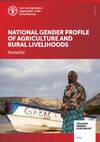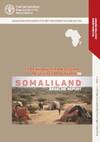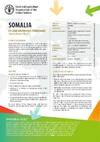Publications
Distance learning via radio for rural communities in Somalia
Overcoming COVID-19 restrictions through adaptive measures that facilitate access to agricultural and nutrition knowledge.
This learning brief documents learning around promising programme approaches that can support decision-making and resource allocation processes towards durable solutions to food crises.
The Horn of Africa is facing the third severe La Niña‑induced drought episode in a decade, and the region is on the verge of a catastrophe if humanitarian assistance is not urgently scaled up. Drought is particularly impacting Ethiopia, Kenya and Somalia and exacerbating the humanitarian situation in a region characterized by underlying vulnerabilities and already suffering from the impact of multiple shocks since late 2019.
Somalia – Data in Emergencies Monitoring (DIEM-Monitoring) brief
This Data in Emergencies Monitoring (DIEM-Monitoring) brief shares the results of a field assessment conducted between 23 July and 17 August 2021 in Somalia. It presents key findings and recommendations for humanitarian actors to utilize in planning and implementing data-driven programming to sustain farmers’ livelihoods and build their resilience to future shocks – protecting the food security of rural Somalis.
Somalia | 2021 Humanitarian Response Plan
Somalia is facing a growing number of threats to its food security. The ongoing desert locust invasion, socio-economic effects of the coronavirus disease 2019 (COVID-19) pandemic and recurrent climate shocks, including frequent flooding and drought, continue to severely impact the lives and livelihoods of the vulnerable population.
Somalia | Shocks, agricultural livelihoods and food security
This report shares an analysis of the effects of natural and man-made shocks in Somalia’s the agri-food system. It analyses the results of a field assessment conducted in August 2021.
Somalia | Agricultural livelihoods and food security in the context of COVID-19
This report shares an analysis of the effects of coronavirus disease 2019 (COVID-19) in the agri-food system in Somalia. It analyses the results of a field assessment conducted in January and February 2021.
Somalia | Agricultural livelihoods and food security in the context of COVID-19
This report shares the analysis on the effects of the coronavirus disease 2019 (COVID-19) in the agri-food system in Somalia based on the assessment conducted during August–September 2020.
National Gender Profile for Gender and Rural Development - Somalia
Gaps between policy and implementation, and limited availability of sex disaggregated data and gender-sensitive indicators to inform sound policies and budgets have kept women marginalized in many sectors. No baselines mean no measurement of progress in effectively implementing the array of commitments towards gender equality and women’s empowerment in agriculture, food security and nutrition, rural development and management of natural resources.
National agrifood systems and COVID-19 in Somalia
Somalia is highly vulnerable to shocks due to its fragile political and environmental circumstances. This vulnerability is aggravated by structural weaknesses that intensify the impact of the recurrent shocks and hinder recovery. The pandemic exposed pre-existing structural factors that challenge the capacity of SMEs, livestock exporters, hospitality, logistics and supply chain sectors to manage the food system in times of crisis.
Somalia continues to face political, social and economic challenges after two decades of civil conflict. This, alongside an inadequate level of external support, has limited the capacity of the Federal Government to fulfil its mandate Institutions remain weak, and policies and legal frameworks are inadequate Livestock diseases are a major handicap to livestock production and exports and often lead to livestock export bans Given the country’s limited human and institutional capacity.
Food and Nutrition Security Resilience Programme
The Food and Nutrition Security Resilience Programme (FNS-REPRO) is a four-year plan addressing the cause‑effect relationship between conflict and food insecurity in Somalia, South Sudan, and the Sudan. In Somaliland, FSN‑REPRO will focus on the fodder value chain, which cuts across humanitarian and development interventions, with numerous missing links in between particularly its access and use by Building food system resilience in protracted crises.
Food and Nutrition Security Resilience Programme
The Food and Nutrition Security Resilience Programme (FNS-REPRO) is the first programme of the Food and Agriculture Organization of the United Nations (FAO) in Eastern Africa specifically designed to foster peace and food security at scale.
Food and nutrition security resilience programme in Somaliland
This report acts as a baseline for the Food and Nutrition Security Resilience Programme (FNS-REPRO) of the Food and Agriculture Organization of the United Nations (FAO), a four-year programme of USD 28 million funded by the Government of the Netherlands.
Desert locust upsurge | Global Response Plan, January–December 2020
The Global Response Plan presents an overview of FAO's ongoing desert locust response activities, as well as funding needs for the remainder of 2020 in order to: sustain ongoing operations and livelihoods support in the Greater Horn of Africa and Yemen, scale up operations and assistance in southwest Asia where the locust is an increasing threat, and prepare for a potential future outbreak in West Africa and the Sahel.
Fostering rural transformation through the Digital Villages Initiative (DVI) in Africa
FAO has launched the corporate programme with the goal of converting globally at least 1 000 rural localities into digital village hubs in which a variety of ICT-based services will be offered. The Digital Villages Initiatives (DVI) is an integrated development vision that enshrines digitalization at the core of rural transformation and prosperity, addressing farm and off-farm socio-economic elements.
Somalia | Humanitarian Response Plan 2020
Since 2016, Somalia has faced climate shocks for eight back-to-back agricultural seasons. From drought to floods and cyclones, these have been increasingly frequent and exacerbated by plant pest outbreaks, including a recent and serious upsurge in desert locusts. This all further undermines the food security, nutrition and coping capacities of millions of already vulnerable people.
Somalia | Revised humanitarian response (May–December 2020)
Somalia faces the triple threat of COVID-19, desert locusts and ongoing severe floods, with the number of people in severe acute insecurity expected to triple by September since the start of 2020.
Since 2006 Somalia Water and Land Information Management (SWALIM) has been operating in Puntland. Informative data has been collected on land, water and climate. The information is organized in themes: Water resources (Climate, floods, water resources and water reports); Land resources (Land degradation, Land suitability, soils and land reports).
The Puntland water and land resources – Information Management Center
The Information Management Center (IMC) will be a special agency under the Puntland State of Somalia whose main function shall be to collect, process and analyze water and land resources information in coordination with the relevant government institutions, in support of policy development for sustainable and integrated water and land resources management, and to provide water and land related data and information to the end users.
Improving genetic quality of seeds in Somalia
The project, known as Somaseed, was an EU-funded project aimed at ‘Improving Genetic Quality of seeds in Somalia’. The project was signed in December 2015. Implementation started in March 2016 and officially finished on November 2019.
Innovative ways of managing Prosopis juliflora trees in Somalia
Safeguarding agricultural and pastoralist livelihoods by transforming a longstanding threat into a sustainable resource for women and youth.
Nutrition-sensitive cash+ in Somalia
Combining cash payments, nutrition education and provision of agricultural and livestock inputs to increase food security and improve diets of drought-affected pastoralists and farmers
Two decades of civil conflict have caused major constraints to development in Somalia. Low human and institutional capacity, extreme rural poverty, low agricultural productivity and high prevalence of food insecurity, combined with the steady flow of returnees and refugees, continuing risks of local conflicts, and a lack of reliable and consistent information have played a significant role in slowing the country’s path to economic recovery.
EU Transversal support to country implementation - Somalia
Rebuilding confidence on land issues in Somalia.
August 2013 marked the first year since the end of the Transitional Federal Government, and the birth of the first democratic Federal Republic of Somalia. This led to a wide-ranging recovery effort of the institutional capacity and structure in Somalia, which had long been in a state of collapse.
Establishment of a Community-Based Fall Armyworm Monitoring System in Somalia - TCP/SOM/3604
In early 2016, a severe outbreak of the fall armyworm(FAW) was reported in southern and eastern Africa. Given the tendency of FAW to migrate long distances, it was only a matter of time before the populations from either Kenya or Ethiopia reached Somalia.
With the COVID-19 pandemic affecting the lives of many people in Somalia, FAO in Somalia embarked on an educating mission where it itends to share with the people how to control and aviod the diseases.
With the COVID-19 pandemic affecting the lives of many people in Somalia, FAO in Somalia embarked on an educating mission where it itends to share with the people how to control and aviod the diseases. FAO intends to do this through infographic messages with both English and Somali messages. This will be distributed as leaflets and posters.
Somalia 2017 - Saving livestock, saving livelihoods, saving lives
Three years of drought have taken a heavy toll on the rangelands and water supplies that Somalia’s 7+ million pastoralists rely on to keep their animals alive and healthy.
Somalia 2017 - Cash for food purchases today, seeds for food production tomorrow
Back-to-back failed harvests in 2016 pushed Somali farming families into an untenable position. Their much-reduced carry-over seed stores were quickly used up. Many went into debt to feed their families, buying food on markets. Others liquidated hard-to-replace assets.
Somalia 2017 - Putting life-saving cash in people’s pockets, rebuilding productive infrastructure
Markets in Somalia are functioning. There is food on their shelves – but scarcity and high prices have pushed it out of the reach of many. FAO unconditional cash relief payments and cash-for-work projects are putting desperately-needed money into the pockets of rural families at high risk. Giving people cash gives them access to food.
Somalia 2017 - Preventing famine, building resilience, promoting recovery
FAO interventions to reinforce rural livelihoods are holding the line against worsening food insecurity, mitigating displacement pressures, reducing the overall humanitarian burden, laying the groundwork for a faster pivot to post-crisis recovery, and building greater resilience to future shocks.
FAO Somalia - Famine prevention and drought response plan February - July 2017
FAO’s Famine Prevention and Drought Response Plan is part of a wider humanitarian response involving UN, and international and local NGO partners to prevent a famine this year in Somalia. It complements WFP, UNICEF and other partners’ response plans to address the main dimensions of food and nutrition insecurity.
Remote sensing: monitoring the Cash for Work programme
The objective of this good practice fact sheet is to provide guidance on using remote sensing technology in a developing country environment, in particular to verify infrastructure rehabilitation.


































